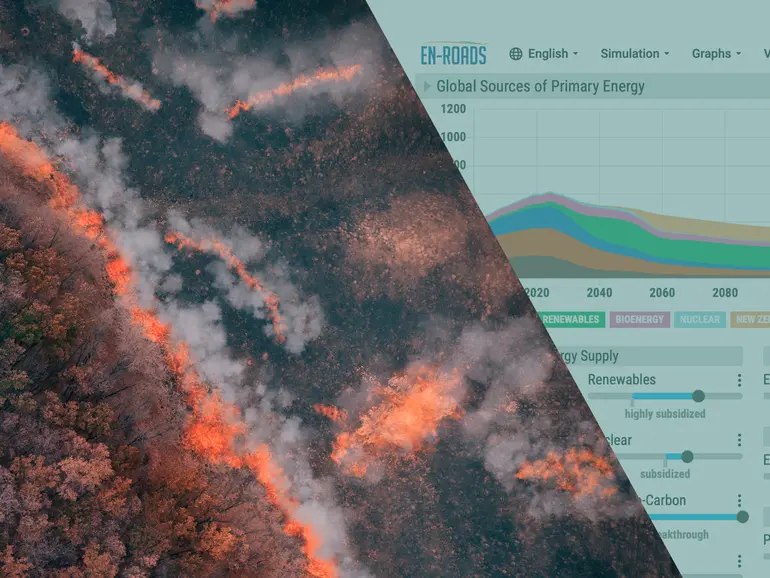4 actions for business to help curb carbon emissions
MIT Sloan climate expert John Sterman spells out the actions businesses can take to mitigate the economic and ecological harms of global warming.

Faculty
John D. Sterman is the Jay W. Forrester Professor of Management at the MIT Sloan School of Management and a Professor in the MIT Institute for Data, Systems, and Society. He is also the Director of the MIT System Dynamics Group and the MIT Sloan Sustainability Initiative.
Sterman’s research centers on improving decision-making in complex systems, including corporate strategy and operations, energy policy, public health, environmental sustainability, and climate change. His work ranges from the dynamics of organizational change and the implementation of sustainable improvement programs to climate change and the implementation of policies to promote a sustainable world. Sterman pioneered the development of “management flight simulators” of corporate and economic systems which are now used by corporations, universities, and governments around the world.
He is the author of many scholarly and popular articles on the challenges and opportunities facing organizations today, including the book, Modeling for Organizational Learning, and the award-winning textbook, Business Dynamics.
Sterman is a Fellow of the American Association for the Advancement of Science and received an honorary doctorate from the Università della Svizzera italiana, Switzerland. He has twice been awarded the Jay W. Forrester Prize for the best published work in system dynamics; has won an IBM Faculty Award as well as the Accenture Award for the best paper of the year published in the California Management Review. He received the Best Application Award from the System Dynamics Society for his work on climate change policy. At MIT, he has been recognized with the Samuel E. Seegal Faculty Prize, given to a professor who “inspires students in pursuing and achieving excellence,” the Jamieson Award for Excellence in Teaching, numerous other awards for teaching excellence; and was named one of MIT Sloan’s “Outstanding Faculty” by the BusinessWeek Guide to the Best Business Schools. His research has been featured in media around the world including the New York Times, Washington Post, Boston Globe ,Public Television’sNews Hour, National Public Radio’s Marketplace, WGBH, and other media for his innovative use of interactive simulations in management education and policymaking, particularly in climate change and energy policy.
Sterman holds an AB in engineering and environmental systems from Dartmouth College and a PhD in system dynamics from MIT.
Featured Publication
"Accelerating Vehicle Fleet Turnover to Achieve Sustainable Mobility Goals."Naumov, Sergey, David R. Keith, and John D. Sterman. Journal of Operations Management Vol. 69, No. 1 (2023): 36-66. Download Paper.
Rooney-Varga, Juliette N., Rachel L. Coleman, Andrew P. Jones, Florian Kapmeier, Peyton Newsome, Krystal Noiseux, Bethany Patten, Kenneth Rath, and John D. Sterman. Communications Earth & Environment Vol. 6, No. 769 (2025).
Li, Tianyi, Hazhir Rahmandad, and John D. Sterman. System Dynamics Review Vol. 41, No. 2 (2025): e70004.
Stempek, Susan B., Michael S. Rosenblatt, Nelson Repenning, John D. Sterman, Janice R. Morrissette, Susan E. Flanagan, Lindsey Sallese, Yuxiu Lei, and Timothy N. Liesching. Dimensions of Critical Care Nursing Vol. 43, No. 5 (2024): 259-265.
John D. Sterman and James Quinn. In MIT Sloan School of Management Case Study 20-199, Cambridge, MA: May 2023.
Gozluklu, Burak, and John D. Sterman. Research Handbook on Complex Project Organizing (2023): 375-382.

MIT Sloan climate expert John Sterman spells out the actions businesses can take to mitigate the economic and ecological harms of global warming.

A free, updated simulator allows users to visualize environmental impacts and better guide climate decision-making in their organizations.
"If oil production goes up, climate change will get worse sooner, and everybody loses, including the people of Venezuela," professor John Sterman said. "The climate damages suffered by Venezuela, along with other countries, will almost certainly outweigh any short-term economic benefit of selling a bit more oil."
"It's better to keep the trees on the land and keep all that carbon out of the atmosphere," said professor John Sterman. "Declaring that biofuels are carbon neutral, as the EU, UK, and others have done, erroneously assumes that forest regrowth happens quickly and fully offsets the emissions from biofuel production and combustion."
Professor John Sterman said: "If oil production goes up, climate change will get worse sooner, and everybody loses, including the people of Venezuela. The climate damages suffered by Venezuela, along with other countries, will almost certainly outweigh any short-term economic benefit of selling a bit more oil."
Professor John Sterman said: "There are no standards, there are no regulations, there are no real sanctions." He said the system needs an entity similar to the Securities and Exchange Commission to provide oversight and enforcement. "I don't see any way to solve this problem with self-regulation, because the incentives and the opportunities for cutting corners and fraud are just too great." By contrast, he said, regulation would help everyone except "the small number of bad actors" and increase the overall size of the market.
This systems thinking course provides an intensive, hands-on introduction to system dynamics, a unique framework for understanding and managing complex businesses and organizations. Participants are introduced to a variety of problem solving tools, including mapping techniques, simulation models, and MIT’s “management flight simulators” to help them understand the sources of persistent problems and how business decisions may result in complicated cause-and-effect loops.
For many companies, the topic of sustainability is at the forefront of business agendas. Consumers and stakeholders are demanding greater accountability from organizations, and the regulatory environment is becoming increasingly stringent. However, pursuing the environmental, social, and governance impacts of business is often met with tension. Leaders now need to manage the misconception within business that meeting sustainability goals means compromising profits.